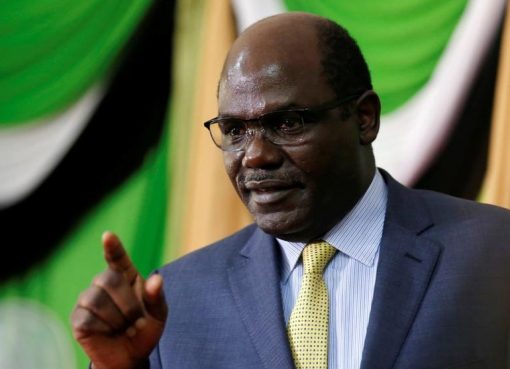The government has announced plans to channel the much awaited Hustler funds through the Cooperative SACCOs to facilitate sustainability and compliance to regulations set for the revolving kitty.
Cooperatives and MSME development Cabinet Secretary Simon Chelugui said the SACCOs were expected to play a critical role in mobilizing Kenyans to embrace a saving culture and act as an intermediate in accelerating financial inclusion and empowerment to the millions of creditors left out of mainstream financial lenders.
Speaking during a consultative meeting with the leadership of cooperatives under the Cooperatives Alliance of Kenya (CAK), the CS said that cooperative movement was touted by the current administration to spur economic growth through of small business under the bottom –up model.
“The most important emergent key economic policy intervention for the new administration is the financial empowerment to accelerate growth at lower levels by creating access to credit facilities under the ‘Hustler’ Fund”
He noted that President William Ruto’s intention was to enable Kenyans at the bottom of the pyramid to access affordable and timely credit facilities since most of them were previously locked out of such facilities because they lacked collaterals to secure loans from mainstream financial institutions.

“ We want to boost a saving culture while creating a momentum for sustainable development and some of the products that will be supported by the fund include Personal loan, Micro Loans, SME loans and Start up loans “, he said.
Chelugui confirmed regulations governing personal loan product was finalized and was tabled for public participation with the first rollout of the flagship programme expected to be unveiled and launched by the Head of State on the of November 30th this year.
He said the Saccos will be fully involved in the Micro and SME lending while applicants for personal loans will access credit through a digital platform and amount on offer will range between Ksh500 to Ksh 50,000 to the more than 7 million people in this category compared to other platforms that only offered between Ksh 700, to Ksh 2000.
“Our difference with others in the market is that this fund we lend through the credit scoring which is a critical tool to assess the suitability and eligibility of applicant, a clear shifting from collateral insurance applied elsewhere” the CS stressed.
Once we are done with the personal loans, he said, focus will shift to preparation on regulations governing the Micro loans where the government will engage and include the input of the cooperatives and saccos.
He regretted that previous efforts by government to offer revolving funds to groups flopped and in many times rarely reached the intended beneficiaries because the banks through which the funds were channeled imposed bureaucracies to withhold back the monies to enable buy time while lending to commercial borrowers at high profit margins.
“We will have service level agreement with SACCOs and banks who qualify for this facility to ensure that delivery realized through a credible intermediary to ensure the impact at the bottom of the pyramid was felt. It will be the biggest bank as we move towards virtual and digital banking to unlock and open opportunities to those people who have been locked out of banks.
He urged the SACCOs for patience adding that the launch of the first product before they ventured on Micro loans would be finalized by January.
Chelugui promised that other policy initiatives that the ministry will be implementing in the coming months is the Central Liquidity Facility CLF) and also shared services platform and Deposit Guarantee Fund (DGF).
He urged the cooperatives leaders to understand the mandate of the new Ministry and align to the government’s policy guidelines and exploit investments opportunities on offer in their sectors areas such as affordable housing.
He also announced plans to increasing production of coffee from the current 40 metric tonnes to 140 metric tonnes per annum while the dairy sub sector was projected to go up from 1.5 million to 3 million litres per day.
He however put employers who delayed in remitting Sacco members contribution on notice adding that more than Ksh 2.3 billion were yet to be submitted yet they were deducted from the workers pat cheques.
“This are monies not remitted for various reasons and yet they were deducted , I want the summary from SASRA on the list and give us one year to see how far we can even if it means we go to the source we will be there”, he said
The CS promised to work with Central Banks, county government and National Treasury to ensure the Saccos do not collapse because of non-remittance of their savings adding that the government will back any action to restore sanity in the sector.
Cooperative Alliance of Kenya Chairman , Mccloud Malonza highlighted some of the key areas that as a movement will require priority and support from the government including the enactment of Cooperatives societies bill into an Act by parliament.
Others are support in the agriculture sector and also re organization of the cooperative movement into federations to support growth in production, value addition and diversification of economic activities.
“We want to position cooperatives to play a key role in promoting environmental sustainability through adoption of climate friendly production initiatives, financing and adoption of green energy “he said .
The Cooperative movement had been affected hugely during the COVID 19 pandemic but despite the turbulence, the sector remained resilient and by the end of 2021 there were over 26,000 registered cooperatives with a membership of over 14 million .
The sector had accumulated assets totaling more than Ksh 1.5 trillion , accumulated saving of 1 trillion and issued loans and advance in excess o Ksh 980 billion and contributes to at least 30 percent of the country’s annual national savings.
By Wangari Ndirangu





